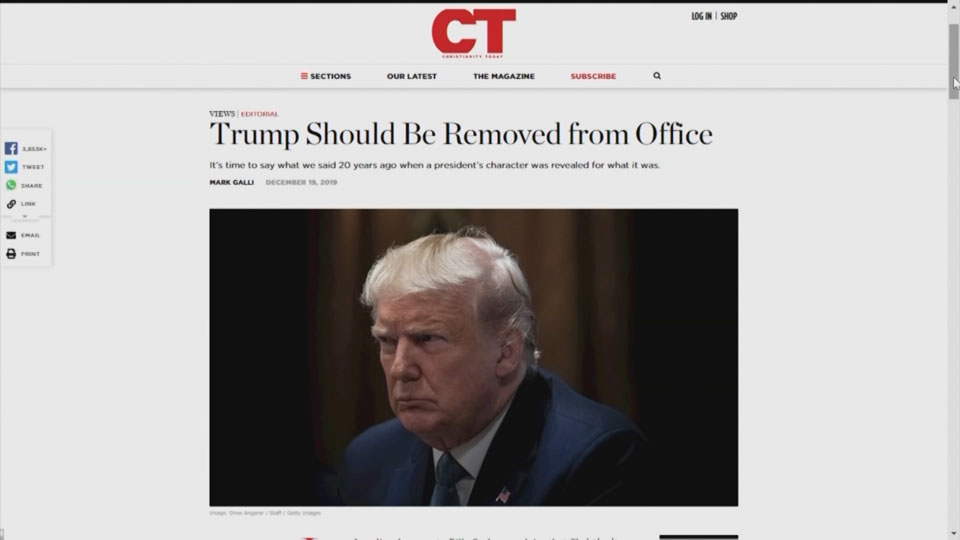In an editorial titled "Trump Should Be Removed from Office," Galli claimed that President Trump had "dumbed down" the idea of morality in his administration, and that the impeachment hearings have shed light on the President's "moral deficiencies for all to see." Galli says he knew the essay would cause a stir within the evangelical community but did not expect quite the scale of attention it ended up drawing. It has racked up more than 3.5 million views.
"The people in the IT department were using every trick they had to keep the site from crashing," he says, chuckling. "They weren't very happy with me because of that."
Interview requests started flooding in the next day. But despite the media attention, his eldest daughter joked that Galli wouldn't become truly relevant until Trump targeted him in a Twitter post. Two hours later, the President did just that. Referring to Christianity Today as a far-left magazine, Trump said the publication would "rather have a Radical Left nonbeliever, who wants to take your religion & your guns, than Donald Trump as your President."
Trump tweeted again later that night: "The fact is, no President has ever done what I have done for Evangelicals, or religion itself!"
Galli says he was stunned that the President of the United States responded to his article at all, but that he wasn't surprised by the nature of the reaction.
"He essentially said the magazine is irrelevant, failing, and doesn’t represent evangelicalism. But if he really believed that, then why bother to tweet? Why not just let it go? He actually demonstrated what I was arguing in the editorial, by name-calling and denigrating Christianity Today and its history."

Some evangelicals have argued that Trump has done a good job representing their values. Since being elected, he has touted his evangelical credentials by repeatedly referencing pro-life positions. But Galli believes Trump’s beliefs are fundamentally un-Christian.
"He's anti-life and anti-human, the way he denigrates people and calls them names, and treats them with such disrespect and contempt," he says. "It's not a pro-life way to treat people."
Galli says he doesn't expect presidents to be perfectly moral and virtuous. But he says evangelicals are holding Trump to a different standard, by removing Christian ethics from how they evaluate him.
Reports in the media speculated that Trump was worried by the potential effects of Galli's article on his evangelical support. 81 percent of white evangelicals voted for him in 2016.
Several weeks after the article's publication, the administration launched the Evangelicals for Trump coalition in Miami, a development which Galli says he found deeply troubling.
"It's an abomination to transform the Christian movement—which is supposed to represent Jesus Christ, His love for the world and the sacrificial work we're supposed to do for him—into the service of a political person. I don’t care if it's Evangelicals for Hillary Clinton or Evangelicals for Pelosi. It's the 'Evangelicals for' part that's a deep and serious problem in the Christian faith."

Readers, both evangelicals and atheists alike, thanked Galli for speaking up and commended him for his bravery. But he shakes his head when asked if he thinks what he did was courageous.
"I don't honestly understand where that praise comes from because the worst thing a writer has to endure is people saying mean things to you," he says. "It's not that big of a deal in the end."
He refers to an incident in Nigeria right after the piece was published, in which 11 Christians were murdered by the terrorist group Boko Haram.
"Those Christians wake up every day and when they claim to be Christians, they know they're putting their life on the line and that's courage. It's not courage to write an editorial which people are going to disagree with."
And there are many evangelicals who disagree with Galli. In a letter to the president of Christianity Today, a group of nearly 200 evangelical leaders criticized Galli, saying he had targeted the President and all of his supporters. Franklin Graham, son of the prominent evangelical pastor and Christianity Today founder Billy Graham, said his father had voted for Trump and would have been disappointed with Galli's opinion.
Despite the ripple caused by the article, President Trump’s approval rating among white evangelicals remains high, standing at 73 percent, according to a NPR/PBS NewsHour/Marist poll.
Galli says he understands why some evangelicals continue to support Trump, no matter how divisive the President's rhetoric.
"Here is this group of people who feel economically and culturally marginalized and they want a champion, a hero, and a knight in shining armor," he says. "So they’ll take any knight at this point, even if the armor is tarnished."

